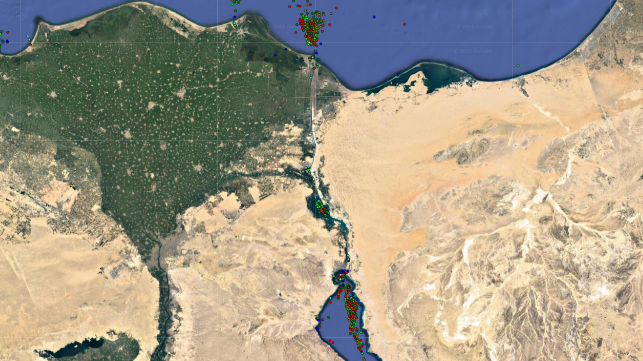20 Livestock Carriers Caught in Suez Canal

According to marine tracking data, at least 20 ships caught up in the Suez Canal are carrying livestock, raising concerns about animal welfare as the logjam drags on.
The grounding of Ever Given, owned by Taiwanese carrier Evergreen, has caused one of the longest closures of the Suez Canal in decades. As a result, hundreds of ships are stuck waiting for the blockage to clear, and many incoming ships are taking the longer route around the Cape of Good Hope.
Vessel tracking website Marine Traffic identified at least 11 vessels that were carrying cattle, sheep, and other livestock, while Australia-based NGO Animals International added another nine to the list, according to The Guardian.
A spokesperson for Marine Traffic, Georgios Hatzimanolis. said three of the carriers - the Omega Star, the Unimar, and the Sea Star - “appear to be stuck at various points in the canal."
According to the NGO Animals International, five of the identified livestock carriers were loaded in Spain, with nine others loading in Romania earlier this month. As per the EU coordinator for Animals International, marine tracking websites showed that Unimar left Spain on March 15, destined for Jeddah. The Omega Star left Spain on March 16, bound for Port Said.
Even though the animals on board are free from danger at the moment, that could change if the salvage effort to free the Ever Given takes weeks to be accomplished.
Peter Stevenson, chief policy officer at Compassion in World Farming, told Bloomberg that he “wouldn’t expect just after a two-day delay for a problem to have built up. It’s as time goes by that the problems get worse. Occasionally, there are real scandals when things go wrong, but it’s a day-to-day horror.”
“My greatest fear is that animals run out of food and water and they get stuck on the ships because they cannot be unloaded somewhere else for paperwork reasons,” he added.
Adapting to the shutdown
Countries across the world have already begun to feel the ripple effects from the Suez Canal closure. The Indian government has already chalked out a four-point plan aimed at dealing with the unexpected situation. The canal is used for Indian exports/imports worth $200 billion to/from North America, South America, and Europe.

that matters most
Get the latest maritime news delivered to your inbox daily.
One of the clauses includes the re-routing of existing ships in the route via the Cape of Good Hope. Public-private cooperation, namely between shipping companies and the Indian government, is also emphasized for the segregation of perishable goods from non-perishable goods.
Top image: AIS data showing vessels stranded in and around the Suez Canal, March 28 (courtesy Pole Star)
